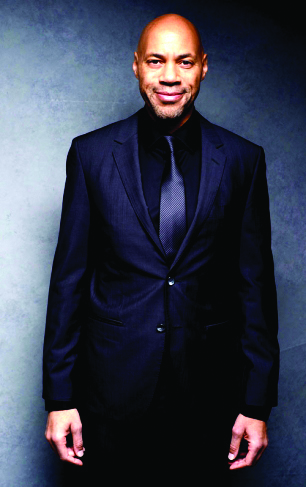Speaking from Los Angeles, writer/director John Ridley is well aware of Seattle’s expectations for his SIFF-opening Jimi Hendrix biopic. Hendrix was, before Nirvana, our greatest musical gift to the world. “There could not be a more appropriate place to show this film than in Seattle,” says Ridley, who recently earned an Oscar for writing 12 Years a Slave. At the same time, he acknowledges, we in the Northwest are protective of the legend surrounding Hendrix (1942–1970), whose family-administered estate is famously guarded about licensing his music and image (one reason Paul Allen’s EMP Museum didn’t end up being simply a Hendrix museum). With that in mind, let’s just drop one spoiler right now: None of Hendrix’s original hits are included in Jimi: All Is by My Side. No “Purple Haze,” no “Foxy Lady.”
“They are entrusted with intellectual property, and they have a right and responsibility to execute it,” says Ridley of the Hendrix estate. So instead of a panoramic, hits-laden, cradle-to-grave approach (think The Doors), Ridley confined his soundtrack and script to Hendrix’s pre-fame period of 1966–67, leading up the Monterey Pop Festival. “With this story,” he says, “we found a way to be honest and true with music. It was a challenge, but it liberated us in some ways. One, because it’s a finite amount of time. It helps to have limits: Even though [Hendrix] only made it to 27, that’s a lot to put into two hours.”
What we hear in New York and London is what Hendrix heard during that period: Steve Winwood, the Animals, the Small Faces, etc.—influences that helped him reach beyond the chitlin’ circuit. We first encounter Hendrix playing to a tiny crowd, merely a backup guitarist. “Jimi at 24 years old was basically washed up,” Ridley says. “He was being put in a corner. So he got into rock and folk a little bit; Bob Dylan was one of his big influences.”
Jimi: All Is by My Side essentially chronicles that transition: from New York to London, from R&B to white-boy rock (and traces of the psychedelia to come). It’s an obscure chapter in Hendrix lore, Ridley explains: “I did a piece for NPR about how Linda Keith discovered [Hendrix] in a club in New York City . . . to see if it played, to see if it had resonance, if there was a story here that had not yet been excavated.”
Played by English actress Imogen Poots, Keith was in 1966 a model and girlfriend of Keith Richards (briefly, amusingly seen), and Ridley later interviewed her for his 2010 NPR story. Jimi (Andre Benjamin, of OutKast fame) was then a broke, shy young musician—unsure of his gifts, unwilling to sing, and surprised by Linda’s coaxing and coaching. In short order, she gets him a manager, a ticket to London, and an introduction to Carnaby Street celebrities including Eric Clapton. The Jimi Hendrix Experience trio is formed, and its first few pub dates are encouraging. (We hear them play tunes like “Hound Dog” and “My Heart Is Bleedin’,” with Benjamin singing and effectively mimicking Hendrix’s left-handed guitar style.)
In London, another woman comes into Hendrix’s life, Kathy Etchingham (Hayley Atwell), and their romance is a more volatile affair than his Pygmalion-like connection to Keith. Fans may not like Ridley’s depiction of their hero: somewhat passive and aimless, with sudden turns of temper and a dreamy, evasive quality. This Hendrix is a bit of an antihero, a cipher, and Ridley’s movie pointedly avoids the usual biopic cliches and a-ha! moments. We see the band coalesce, less so the man.
Ridley describes Keith’s influence on Hendrix as “just do what you’re doing, figure out who you are as a man” and artist. Yet he’s in a crucible, subject to influences both good and bad. “Like a lot of artists, he had a lot of self-doubt,” says Ridley. “You let the wrong people in [to your confidence], and they tell you the wrong things. He passed away before he had a complete understanding of himself. When he went to London, he was performing as Jimmy James; when he came back, he was Jimi Hendrix.”
So did Hendrix, in the three years between the period Ridley covers and his death, achieve a more concrete sense of self? “I think to a degree,” says Ridley, who’ll attend SIFF’s opening night. “I think if he had more a sense of himself, he’d be alive right now. He pushed people away who really cared about him, like Linda, like Kathy, like Chas Chandler [his manager]. He was trying to get back together with those people, but the timing was just too late.”
bmiller@seattleweekly.com
JIMI: ALL IS BY MY SIDE McCaw Hall, 321 Mercer St. (Seattle Center), 324-9996, siff.net. $45–$250. 7 p.m. Thurs., May 15.
For more SIFF coverage, see all of Seattle Weekly’s predictions and previews here.








